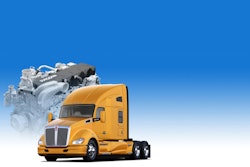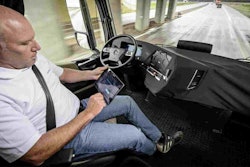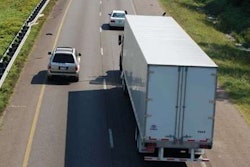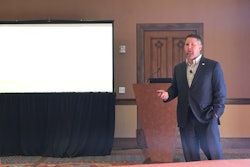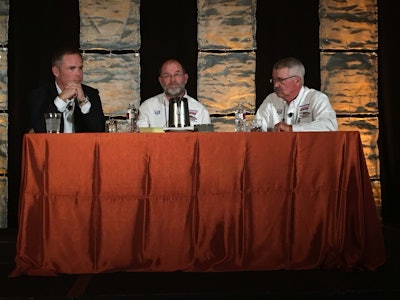 CCJ editor Jeff Crissey (left) moderated a panel with drivers David Green and Danny Smith.
CCJ editor Jeff Crissey (left) moderated a panel with drivers David Green and Danny Smith.Two of the American Trucking Associations (ATA) America’s Road Team Captains expressed their top concerns to close out the CCJ Fall Symposium in Scottsdale, Ariz., Wednesday.
The Road Team is ATA’s national public outreach program led by a small group of professional truck drivers who seek to spread the word about safety on the highway.
David Green, a driver for Werner, listed parking as his biggest challenge with distracted drivers a close second. The differential speed limit, and the looming speed limiter mandate, was his concern No. 3.
“We already have [speed limiters] and it’s called a speed limit sign,” adds Danny Smith, the first driver hired by Big G Express and who still drives for the company today, having recently eclipsed 3 million safe miles. “In order to take care of this problem, we just need to enforce our laws. There’s no two trucks, even though they are exactly the same, that will run the same speed.
“Restricting the trucks to one speed is going to congest our highways like we’ve never seen before,” he adds.
Both Smith and Green agree that the lack of truck parking is a top concern but Smith lists detention time among his Top 3.
Smith says detention penalties for shippers should be built into every contract because, without it, the person paying the price in every case is the driver.
“You’re sitting there worrying about, ‘I’ve got a mortgage payment and insurance… and I’m sitting here not making any money,'” Smith says.
“It wears on you,” Green adds.
When recruiting new drivers, Smith says it’s important for fleets to deliver on their promises. Everybody wants consistent miles and pay and now, he says, adding home time is more important than ever.
“When you tell them you’re going to get them miles, be consistent in what you say,” he says. “And when a driver requests home time … if you can, you try and work with them.”
“They want local jobs,” Green says of how the new generation of drivers compares to veteran drivers. “They expect everything to be touchscreen, so they are learning a totally new technology on the road. They want the nice trucks and they think they deserve them.”
“We knew we had to pay our dues and we knew we had to work our way up to get perks like that and the younger generation doesn’t think they have to do that.”
Drivers are almost always going to push back when you force technology on them, but Smith says communication between fleet executives and drivers is key to mitigating it.
“If a driver quits you over E-logs, they’re going to be everywhere in a few years,” he says. “So then what’s he going to do?”
Green says slowly introducing the technology into the fleet can also help build a support base as drivers who have positive experiences are often a fleet’s best salesperson.
Smith says the industry as a whole needs to do a better job of promoting its best drivers and to improve the image of trucking.
“If it’s trucking, what do you see? You hardly ever get to see anything positive,” he says. “Do you ever see 3.4 million drivers delivered safely and on time today? All you ever see is that one that had the accident.”
Green says driver accomplishments, both professional and personal, should be highlighted. Also, he says, driving is a profession and drivers should dress and act professionally.
“Every driver represents trucking to the public,” he says.


